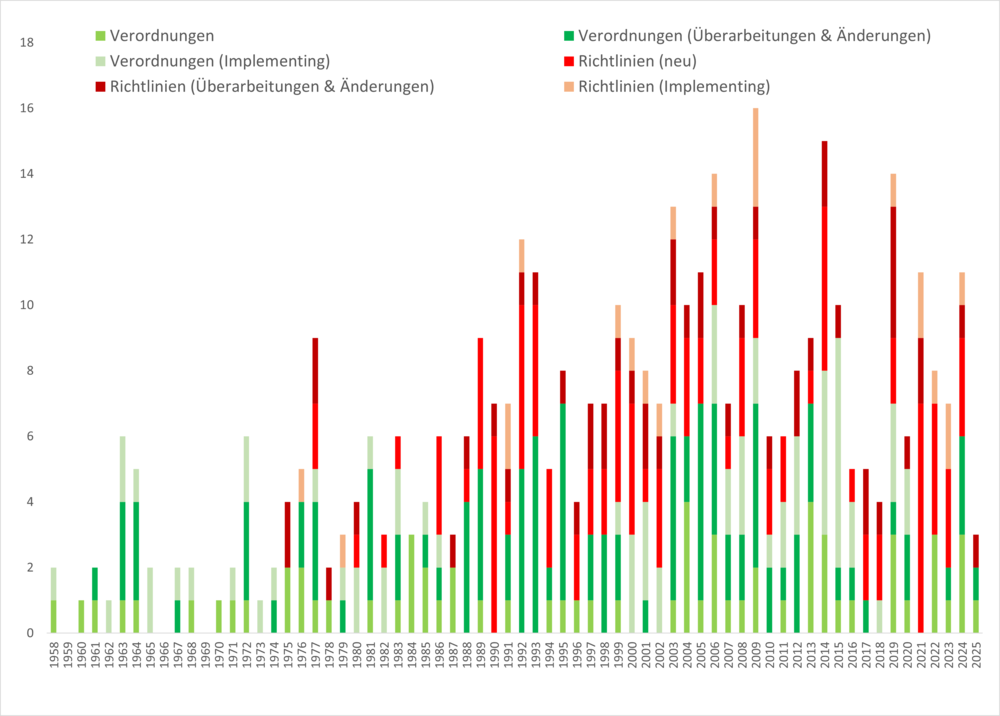SozPol-Database
The database covers EU social policy and offers an overview over the development of social policy since the beginning of European Integration up until 2025 (last updated: 12.2025). It is part of a multi-annual project that was conducted at the University of Bremen, University of Leipzig and the Freie Universität Berlin. All further information can be found here.
The founding treaties of the European Union (EU) viewed economic integration as the key to greater prosperity and better living conditions for all, while genuine social policy was to remain the prerogative of the Member States. Consequently, the Member States limited the EU’s competences in social policy, and a European social policy developed only slowly.
By the mid-1970s, there were only a few EU instruments, mostly closely linked to the integration of the internal market. Regulatory instruments aimed at coordinating social security systems in order to support the free movement of workers, or at ensuring equal pay for male and female workers to prevent a competitive disadvantage for countries that already applied this principle, such as France. Distributive instruments of the European Social Fund focused on addressing labour market bottlenecks through skills development. In this early phase, EU social policy was limited to a few substantive priorities, remained largely unnoticed outside expert circles, and had little visible impact on a broader segment of the EU population.
This began to change slowly when, in 1973, the European Commission proposed its first Social Action Programme (SAP), marking the start of a more dynamic development. Especially under Jacques Delors, who is credited with the remark that “one cannot fall in love with the single market”, European policymaking sought to establish a more visible EU social policy. And when the internal market was completed in 1986 with the Single European Act, new instruments pursuing genuinely social policy goals emerged alongside existing ones that supported the free movement within this market. Shortly thereafter, the Community Charter of the Fundamental Social Rights of Workers was adopted (1989), and the Maastricht Treaty (1992) included a Social Protocol signed by all Member States except the United Kingdom (which joined later following a change from a Conservative to a Labour government). The Amsterdam Treaty (1997) added an Employment Title and a new anti-discrimination article. These changes are significant, as they broadened the EU’s priorities and, in many areas, facilitated decision-making through qualified majority voting.
Overall, this treaty framework gave rise to a legal foundation of minimum labour law standards—such as on working time, European Works Councils, and the information and consultation of workers. This increasingly made the European arena relevant for a range of different actors actively pushing for and shaping EU social policy, such as the European social partners and a number of social NGOs.
You can find a selection of scientific papers that utilized the database here:
- Graziano, Paolo R. und Miriam Hartlapp. 2019. The End of Social Europe? Understanding EU Social Policy Change. Journal of European Public Policy 26 (10): 1484-1501. doi: 10.1080/13501763.2018.1531911 . Zum Artikel
- Hartlapp, Miriam. 2019. Revisiting patterns in EU regulatory social policy: (still) supporting the market or social goals in their own right? Zeitschrift für Sozialreform 56 (1): 59–81. doi: 10.1515/zsr-2019-0003 . Zum Artikel
- Hartlapp, M. (2020) ’European Union Social Policy: Facing Deepening Economic Integration and Demand for a More Social Europe With Continuity and Cautiousness’. In Blum, S., Kuhlmann, J. and Schubert, K. (eds) Routledge handbook of European welfare systems. (London, New York: Routledge, Taylor et Francis Group). Zum Artikel
- Hartlapp, Miriam. 2020. Zwei realistische Perspektiven für einen sozialen Binnenmarkt. Edited by Bundesministerium für Arbeit und Soziales, DEUTSCHLANDS VORSITZ IM RAT DER EUROPÄISCHEN UNION JULI DEZEMBER 2020 - Begleitband des Bundesministeriums für Arbeit und Soziales. Berlin. Zum Artikel
